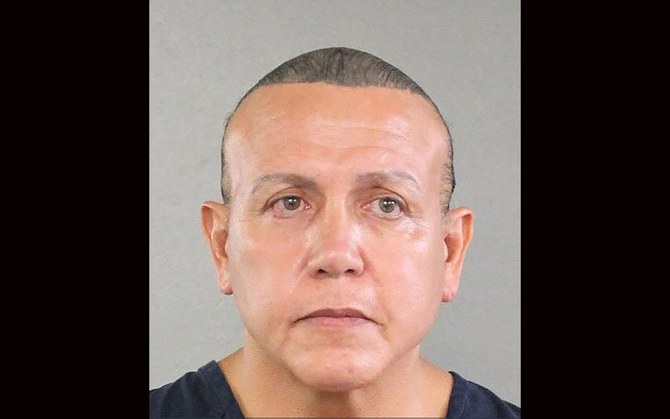NEW YORK: A fan of US President Donald Trump who mailed parcel bombs to prominent Democratic figures last October was set to appear in court Thursday, where he was expected to plead guilty to some of the 30 charges against him.
Cesar Sayoc, 57, who was arrested in Florida on October 26 following a massive manhunt, was due in federal court in New York at 4:00 p.m.
Although it was not known which charges he would plead guilty to, all relate to the 16 package bombs he is accused of mailing from a Florida post office to several well-known people who oppose Trump, as well as the Manhattan offices of CNN. He previously pleaded not guilty to all counts.
The packages’ intended recipients included billionaire philanthropist George Soros, former secretary of state Hillary Clinton, former president Barack Obama, former vice president Joe Biden, actor Robert De Niro and several Democratic lawmakers, including 2020 presidential hopefuls Cory Booker and Kamala Harris.
None of the packages exploded or even reached their targets and authorities questioned the actual danger they posed.
But by targeting Democrats, Sayoc — who also goes by the alias Cesar Altieri and was identified by DNA recovered from the packages — helped contribute to heightened tensions during the US midterm election campaign season.
Sayoc’s partial guilty plea Thursday could help mitigate the severity of a sentence if he is convicted on all counts.
As his trial loomed, information from Sayoc’s past began to filter into the public sphere, fueling the debate about extremism in the age of Trump and social media — a debate that grew more urgent as 11 people were shot dead at a Pittsburgh synagogue later in October.
Estranged from his family and in financial distress, Sayoc lived in a white van plastered in stickers proclaiming his admiration for the US president.
His criminal record dates back to 1991, peppered with convictions for theft, fraud, violence and a threat to bomb his electric utility company.
A former strip club manager and an adept bodybuilder and martial arts practitioner, Sayoc discovered a passion for Trump just as his political star was rising.
His social media posts took a politically radical turn: he’s seen wearing a “Make America Great Again” hat, sharing pro-Trump images and posting articles from ultra-conservative and conspiracy-driven websites such as Infowars and Breitbart.
“He was very angry and angry at the world, at blacks, Jews, gays,” recalled Debra Gureghian, the general manager of a Florida pizzeria where Sayoc worked as a delivery driver for several months.
Lawyer Ron Lowy, who defended Sayoc in 2002 and remained close to his family, described him on NPR in October as someone whose “intellect is limited, and who is “like a little boy in a man’s body.”
Trump fan to plead guilty to 2018 package bombs
Trump fan to plead guilty to 2018 package bombs

- The package bombs’ intended recipients included billionaire philanthropist George Soros, former secretary of state Hillary Clinton, former president Barack Obama
- Cesar Sayoc’s criminal record dates back to 1991
Nine Nigerian troops killed, several missing in jihadist ambush

- “We lost nine soldiers in an ambush by Daesh-WAP terrorists and many others are still missing,” a military officer said
- The soldiers dispersed in all directions following sustained gunfire from the militants
KANO, Nigeria: At least nine Nigerian soldiers were killed and over a dozen are missing after Daesh-aligned militants ambushed a military patrol in northeast Borno state, military and militia sources told AFP Tuesday.
Fighters from Daesh West Africa Province (Daesh-WAP) on Friday used explosives and guns to attack a column of more than 30 troops on foot patrol outside the town of Damask near the border with Niger, the sources said.
“We lost nine soldiers in an ambush by Daesh-WAP terrorists and many others are still missing,” a military officer said.
The soldiers, who were 25 kilometers (15 miles) from their base, dispersed in all directions following sustained gunfire from the militants, said the officer who asked not to be identified.
“The terrorists detonated an explosive device they had planted on the road in advance, increasing the casualties and confusion among the soldiers,” he said.
Eight soldiers managed to return to base while the rest remain missing, including their commander with the rank of a major, the officer said.
“A man who identified himself as an Daesh-WAP terrorist keeps answering the call to the commander’s mobile phone, suggesting he is in the hands of the terrorists,” he added.
Ya-Mulam Kadai, a spokesman for government-funded anti-militant militia assisting the military in Damask, gave the same casualty toll.
The nine bodies of the slain soldiers were recovered by a military search team deployed at the scene of the attack, he said.
The military did not respond to AFP’s request for comment.
The Nigerian military has in recent weeks intensified ground operations against Daesh-WAP, particularly in its Sambisa forest stronghold, with the military making regular claims of killing huge numbers of militant fighters.
Daesh-WAP and rival Boko Haram factions have been attacking military targets, raiding bases, laying ambush and planting explosives against patrols on highways.
Nigeria’s insurgency has killed more than 40,000 people and displaced around two million in the northeast since it erupted in 2009, according to the United Nations.
The conflict has spilled into neighboring Niger, Cameroon and Chad, leading the region to launch a military coalition to fight the militant groups.














